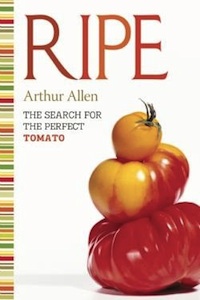You Say Tomato, I Say Tomato

Ever since I read (in 1977) Thomas Whiteside’s exposition on tomatoes, entitled simply “Tomatoes,” I have used it as an example of 1) the discovery of a piece of writing on a subject I was not inclined to pay attention and, 2) another good reason the New Yorker is a default source of unexpected text-based delights (which is why I leave my copies in my ragtop—there are those unexpected times when one finds oneself with an opportunity to read—need I say more?).
For pathological reasons I suspect I probably will never encounter another piece of writing on tomatoes that surpasses the satisfaction I received from Whiteside’s piece, but that hunt has led to me taking up Arthur Allen’s enticing Ripe: The Search for the Perfect Tomato (Counterpoint). Though there is a bit of zealotry (zealousness) and golly-gee about his approach to this subject, as exhibited in this exchange:
Ripe
Allen does amass a notable and enjoyable array of facts and references about the “seeded succulent,” and reaches across a vast geography to mention La Tomatina, one of the wackier human celebrations on the planet, as well as also charting the ascension of the tomato in various national cuisines and discussing the biology of tomato breeding. Allen also points out:
We humans have come to be cruel taskmasters of the tomato. We want it to leave its vine and go places. The average tomato consumed in America, according to a study conducted by Adel Kader at the University of California at Davis in the 1980s, moves 1,028 times from when it is picked on a Sinalao ranch to when it turns up in a Los Angeles supermarket.… For some purists, the answer is not to eat tomatoes unless they are grown nearby. But many people would like to eat tomatoes out of season and would rather eat one grown halfway around the world than not eat one at all. There may be questions of the environmental impact of this goal, but there are also wholesome reasons to eat tomatoes year around.
